James Monroe (1758-1831), fifth president of the United States, a founder of the Jeffersonian Republican party and a major agent in acquiring Louisiana and Florida, authored the celebrated American foreign policy statement, the Monroe Doctrine. James Monroe was born in Westmoreland County, Va., on April 28, 1758, on his parents' small plantation. He enrolled in William and Mary College in 1774 but left 2 years later, with the beginning of the American Revolution, to enlist as a lieutenant in the 3d Virginia Regiment. He was seriously wounded in the action at Trenton, and his heroism earned him the rank of major. In 1777 and 1778 he was aide to Gen. William Alexander (Lord Stirling) with the rank of colonel. Unable to obtain a field command because of the excess of officers, he returned to Virginia and entered the lower house of the legislature in 1782. At this time he formed his friendship with Governor Thomas Jefferson, with whom he began to study law. In 1783 Monroe was elected to the governor's council; the next year he, Jefferson, and Richard Henry Lee were members of the Virginia delegation to the Confederation Congress. Monroe labored to strengthen the central government, but after failing to secure reform through Congress, he endorsed the recommendation that a special convention be held. He was responsible for the structure of territorial government incorporated in the Ordinance of 1787. In 1786 he led the fight against the proposal of John Jay, Secretary for Foreign Affairs, to negotiate a treaty with Spain closing the Mississippi for 20 years in return for commercial concessions. While a member of Congress he married Elizabeth Kortright, one of the most beautiful women of her generation. Monroe was not a member of the Constitutional Convention, but as a delegate to the Virginia ratifying convention, he opposed ratification unless the Constitution was amended. After the new government was inaugurated and the amending process under way, he ceased his opposition. At this time he shifted his residence to Albemarle County adjacent to Monticello, Thomas Jefferson's home. U.S. Senator After a few years of law practice Monroe entered the U.S. Senate in 1790. He emerged as a leading critic of George Washington's administration, which, he felt, was favoring the commercial class and seeking closer ties with Great Britain. He attributed these policies to the influence of Alexander Hamilton. Monroe joined James Madison and Jefferson in organizing the opposition that developed into the Republican party. Diplomatic Posts In 1794 Washington appointed Monroe minister to France. Monroe accepted at the urging of the Republicans, who felt that friendship with France was essential for the preservation of republican government in the United States. Arriving in France immediately after the downfall of Robes-pierre, Monroe was able to ease recent tensions, but he irritated Washington by publicly voicing enthusiasm for the French Revolution. The ratification of Jay's Treaty led to a worsening of relations between France and the United States, and Monroe was recalled in 1796 in a manner casting doubt on his conduct. He published a vindication, asserting that the administration was seeking to join England in the war against France. As proof that Monroe's recall had not shaken party confidence, the Republicans elected him governor of Virginia in 1799. He proved an able administrator, acting decisively to suppress the attempted slave rebellion (Gabriel's Rebellion) in 1800. In 1803 President Jefferson sent him to France to assist Robert R. Livingston in seeking a port for America at the mouth of the Mississippi River after Spanish authorities had closed the river to American ships. In France, Monroe learned that Napoleon, who had acquired Louisiana from Spain, had offered to sell all Louisiana. Although empowered to buy only a small tract, Monroe and Livingston purchased the whole region. From 1804 to 1807 Monroe was minister to Great Britain. In 1806 Monroe and William Pinkney concluded a treaty with Great Britain permitting American ships to carry produce of the French colonies to France if American duties were paid. Jefferson and his secretary of state, James Madison, did not consider this arrangement a sufficient compensation for the omission of impressment, which they deemed the sine qua non for any treaty with England. Consequently, it was not submitted to the Senate. Deeply offended, Monroe allowed dissident Republicans in Virginia to run him against Madison in the 1808 presidential election. Madison won, but Monroe garnered enough votes to indicate wide support. In 1811 President Madison, plagued by factional conflicts within his own party and a resurgence of federalism, appointed Monroe secretary of state. Secretary of State Monroe's entry into the Cabinet did not change the policy of commercial warfare with Great Britain, but it did strengthen the administration. Enjoying great popularity among the younger Republican congressmen, Monroe worked with them to implement presidential policies. He collaborated with the "War Hawks" in drafting the measures that culminated in the declaration of war against England in 1812. He continued in the State Department during the war, serving simultaneously as secretary of war after John Armstrong retired in disgrace following the burning of the capital. Presidential Policies Monroe was named Republican presidential candidate in 1816. The Federalists offered only token opposition. As president, Monroe was an old-fashioned figure, wearing his hair pulled back in a queue and clad in the black clothes of the Revolutionary days. Tall, dignified, and formal in manner, he was admired for his genuine goodness, warmth, and lack of malice. His face was rather plain with massive features, but his widely set gray eyes and his smile reflected benevolence. He did not reach decisions quickly, for he was inclined to reflect carefully on all aspects of a question. His attention to detail gave him a soundness of judgment often lacking in more original minds. His remarkable awareness of the trends of public opinion contributed to his political success. He introduced into the White House a new, more formal note. Although he received congressmen, state party leaders, and citizens freely, he kept diplomats at a distance. Monroe's Cabinet consisted of John Quincy Adams (State), William H. Crawford (Treasury), John C. Calhoun (War), William Wirt (Attorney General), and Benjamin Crowninshield, followed by Smith Thompson and Samuel L. Southard (Navy). If Monroe's appearance suggested the past, his policies were distinctly contemporary. A moderate nationalist, he supported the Bank of the United States, sought to maintain a large peacetime army, and approved the protective tariff. Monroe made the restoration of political harmony (which meant, in effect, the elimination of parties) a major goal. To facilitate this, he toured the Union, journeying to New England in 1817 and to the South and West in 1819. The "Era of Good Feeling" that followed was short-lived. In 1820 Monroe, who was unopposed, received all the electoral votes but one. During Monroe's presidency two major domestic crises occurred. The Panic of 1819 resulted from the overexpansion of credit during and after the War of 1812. The abrupt decline in government revenues forced a drastic reduction in the appropriation for the extensive system of coastal fortifications that Monroe had undertaken. The second crisis took place in 1820, following attempts to make the abolition of slavery a condition for the admission of Missouri to statehood. This conflict so divided the nation that many feared the Union would be destroyed. Monroe opposed any restriction on Missouri, but in the interest of harmony he accepted the compromise admitting Missouri as a slave state but excluding slavery from north of 36°30' in the Louisiana Territory. Monroe's most important accomplishments were in foreign affairs. In 1819 he capitalized on Andrew Jackson's invasion of Florida to pressure Spain into ceding Florida and establishing the western and northern boundaries of Louisiana. Jackson's seizure of Spanish military posts precipitated a domestic furor. Many felt he should be reprimanded for exceeding his orders. Monroe, who appreciated the advantage Jackson's action gave him in negotiations with Spain, chose a middle course. He restored the posts and acknowledged that though Jackson had violated his orders, he had acted on reasons that seemed sufficient during the campaign. Monroe Doctrine In spite of considerable pressure for recognizing the new Latin American states, Monroe held off until 1822, after ratification of the treaty with Spain. His concern that the European powers might intervene in South America to restore Spanish authority seemed justified in 1823, after France suppressed revolution in Spain. Consequently, in 1823 Monroe was inclined to accept Britain's proposal that the United States and Great Britain jointly declare opposition to European interference in Latin America. However, though Jefferson and Madison urged him to accept, Monroe, desiring the United States to pursue an independent course, decided to act unilaterally. In his annual message of Dec. 2, 1823 (subsequently known as the Monroe Doctrine), he expressed disapproval of European intervention and affirmed America's intention of not interfering in the internal affairs of other nations. The message also contained a statement that the Americas were not to be considered open to further European colonization. Last Years Monroe's last years in office were harassed by the intraparty battle for the 1824 presidential nomination. His hope for a general rapprochement with England was frustrated when a treaty to suppress the international slave trade was so amended that England withdrew ratification. Monroe's retirement was plagued by financial difficulties. He obtained some relief when Congress voted him $30,000 in 1826, and a similar sum in 1831. Until his health failed in 1831, he was a member of the board of visitors of the University of Virginia. In 1829, as a member of the Virginia Constitutional Convention, he joined Madison in an unsuccessful attempt to arrange a compromise between Eastern and Western interests. He died in New York City on July 4, 1831.
|
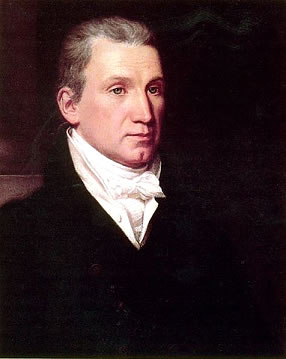 |
James Monroe Born: April 28, 1758
|
|
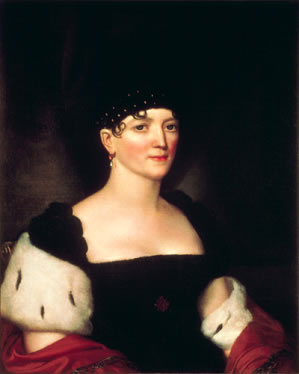 |
|
First lady: Elizabeth Monroe |
|
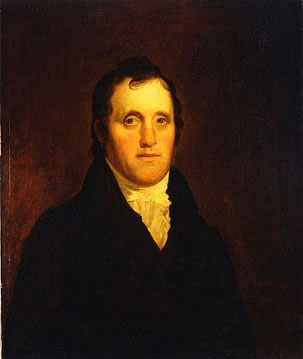 |
|
Vice-president: Daniel Tompkins |
|
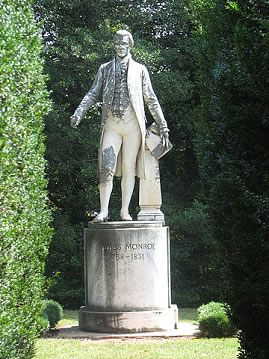 |
|
| Statue of Monroe at Ash Lawn-Highland | |
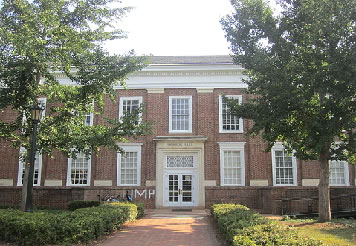 |
|
| Monroe Hall at the University of Virginia; Monroe once owned the land on which the university sits. | |
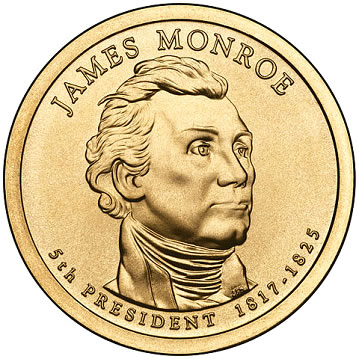 |
|
| Presidential Dollar of James Monroe | |
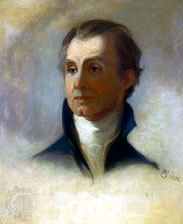 |
|
| James Monroe | |
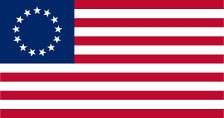 |